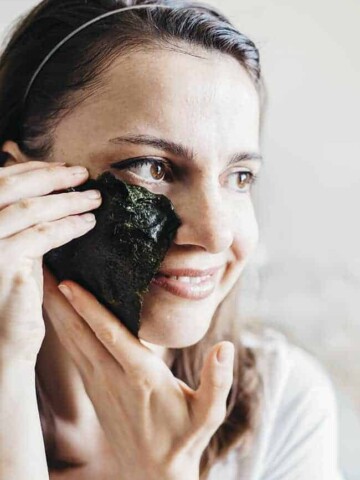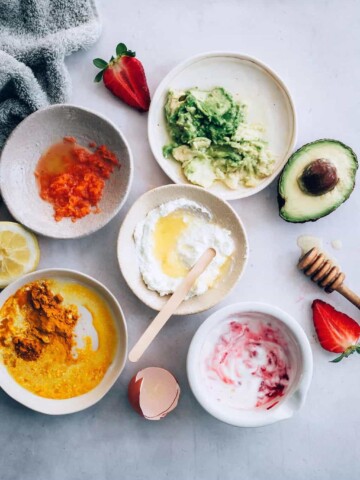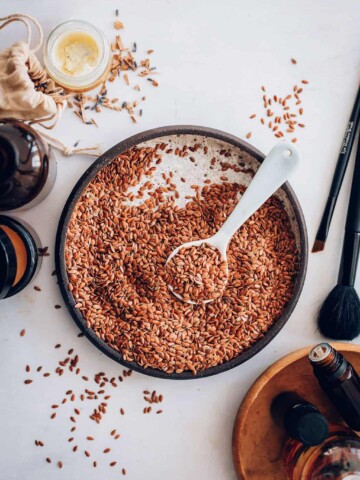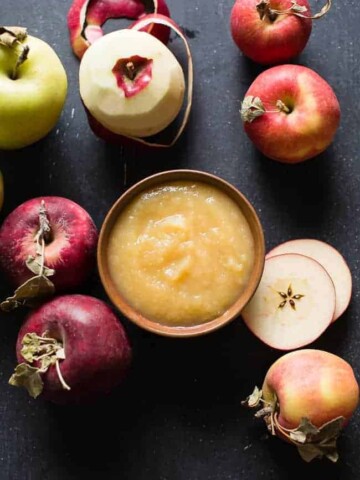Making an activated charcoal face mask at home is a great way to cleanse and detoxify your skin. These DIY charcoal mask recipes battle oily, troubled skin by fighting bacteria, exfoliating, and absorbing excess oil. Read on for the recipes!
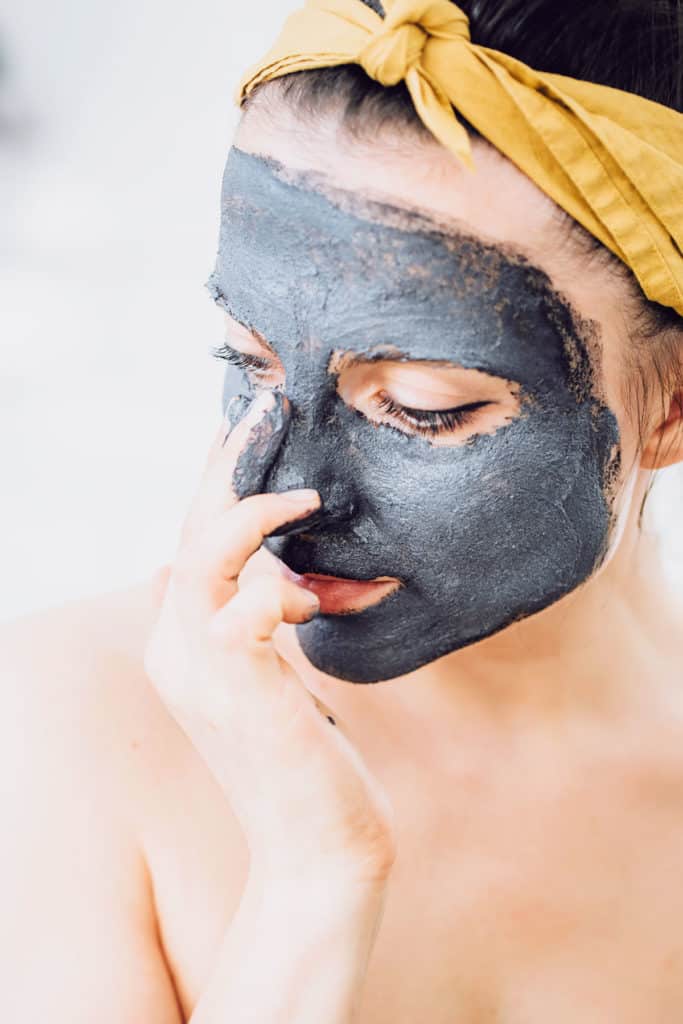
Charcoal face masks may not look flattering, but when has a face mask ever looked good? Exhibit A: Our favorite turmeric face mask!
We've learned to embrace activated charcoal in our beauty routines because we know how beneficial it can be for our skin, teeth, and tummy—bye-bye bloating!
Jump to:
- Why Use Activated Charcoal Face Masks?
- 1. Probiotic Charcoal Mask for Oily Skin
- 2. Skin-Tightening Charcoal + Egg White Face Mask
- 3. Foaming Charcoal Blackhead-Busting Mask
- 4. Moisturizing Charcoal + Honey Face Mask
- 5. Acne-Fighting Charcoal + Aloe Face Mask
- 6. Charcoal Detox Cleansing Grains + Mask
- 7. Gentle Exfoliation Charcoal + Yogurt Face Mask
- 8. Pore Cleansing Charcoal + Clay Mask
- 9. Charcoal Peel Off Mask
- 10. Oats + Charcoal Face Mask For Dry or Sensitive Skin
- 11. Green Tea Charcoal Mask For Combination Skin
- 12. Rose Charcoal Mask For Aging Skin
- 13. Papaya Charcoal Mask For Dull or Uneven Skin Tone
- More Ways To Use Charcoal
- FAQ
Why Use Activated Charcoal Face Masks?
Charcoal has a unique ability to bind with toxins and impurities [source], so it’s most likely that bacteria, dead cells, oil, and toxins are swept away when charcoal enters the game.
Activated charcoal may bind to dirt on the skin only when in direct contact with debris. It naturally works together with popular face mask ingredients like clay, honey, and yogurt to make them even more effective.
Scroll down for some of our favorite ways to use activated charcoal in homemade face mask recipes:
1. Probiotic Charcoal Mask for Oily Skin
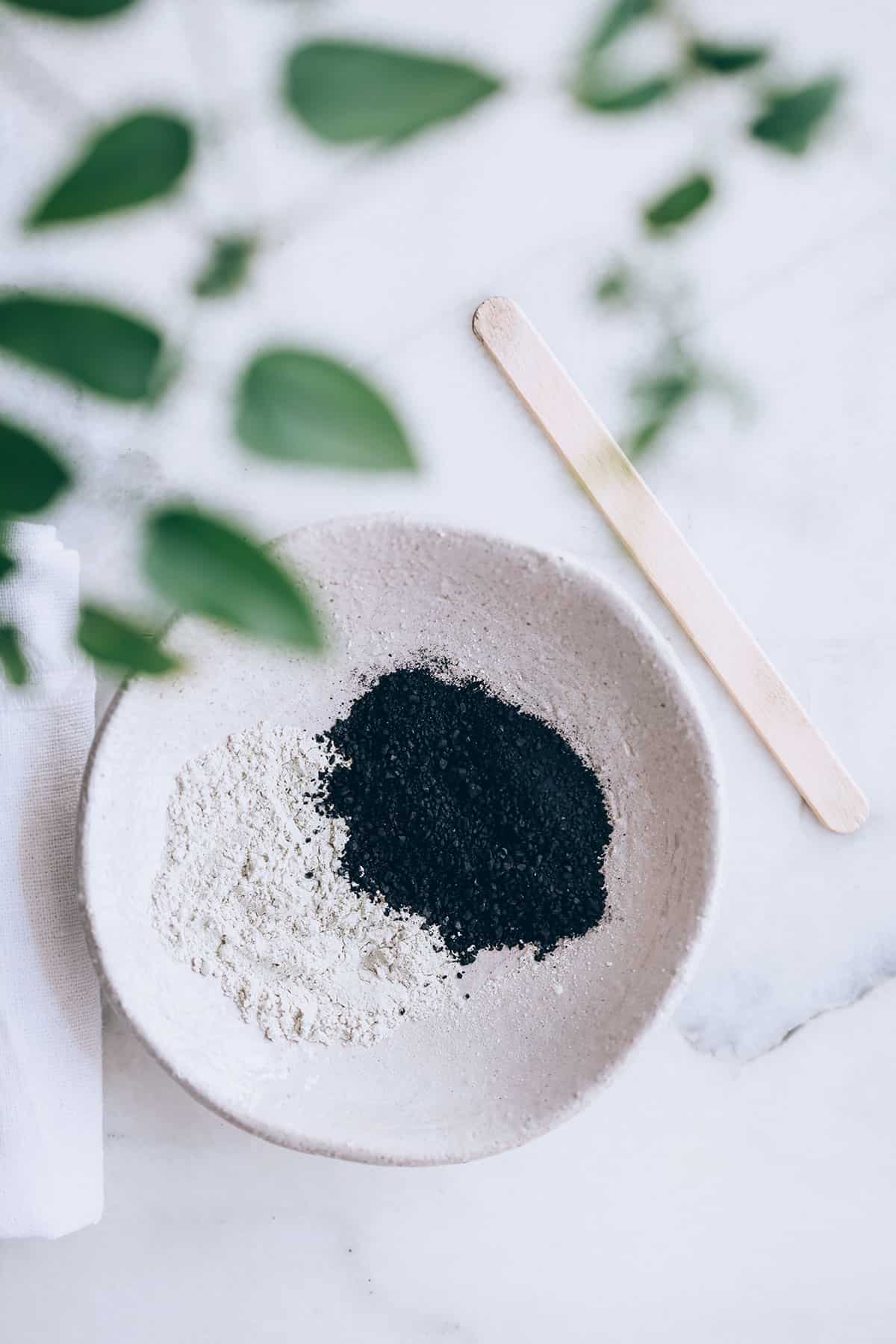
Clay and activated charcoal are excellent oily skin face mask ingredients for absorbing excess oil. Plus, the addition of probiotics and apple cider vinegar helps prevent acne.
Probiotics contain ingredients that help fuel the growth of the helpful germs that already live on the skin and destroy the harmful bacteria that cause painful acne bumps [source].
—1 tbsp clay
—1 tbsp activated charcoal
—1 probiotic capsule
—2 tablespoon raw organic apple cider vinegar
—1 drop essential oil for acne
Combine activated charcoal, clay, and probiotic powder in a small bowl. Add the ACV to make a paste. It's okay to use more, if needed, to get a smooth, spreadable consistency.
Add essential oil and stir. With clean fingers, spread over the face and let sit for 15 minutes. Rinse with cool water and apply moisturizer.
2. Skin-Tightening Charcoal + Egg White Face Mask
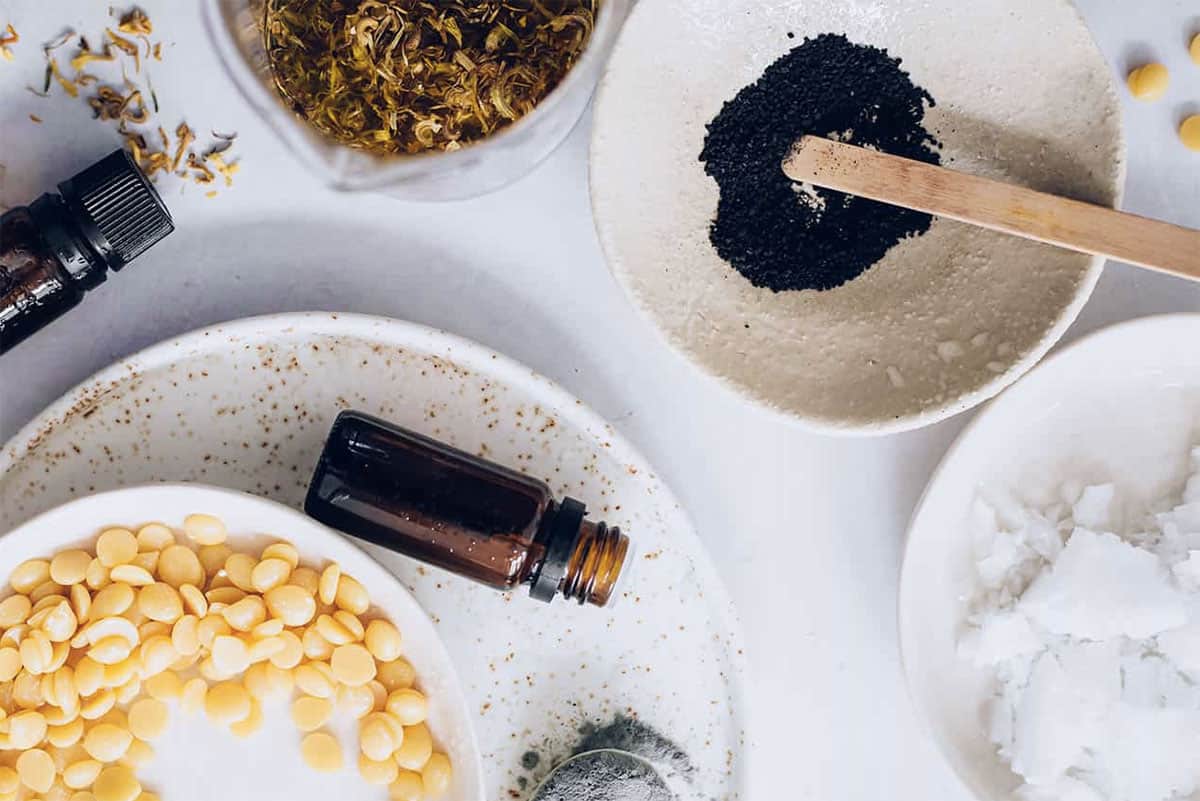
An egg white face mask is the perfect complement to activated charcoal. Egg whites can help (temporarily) firm saggy skin while also tightening pores as charcoal draws out the gunk.
—1 egg white
—1–2 activated charcoal capsules
—¼ teaspoon lemon juice
Beat the egg white with a fork until fluffy, and then add in the charcoal and lemon juice. Apply the paste to your face or just your t-zone area if your skin is really dry.
If the consistency is a bit thick, add a ½ teaspoon of water. After 10 minutes, rinse off the mask with warm water.
3. Foaming Charcoal Blackhead-Busting Mask
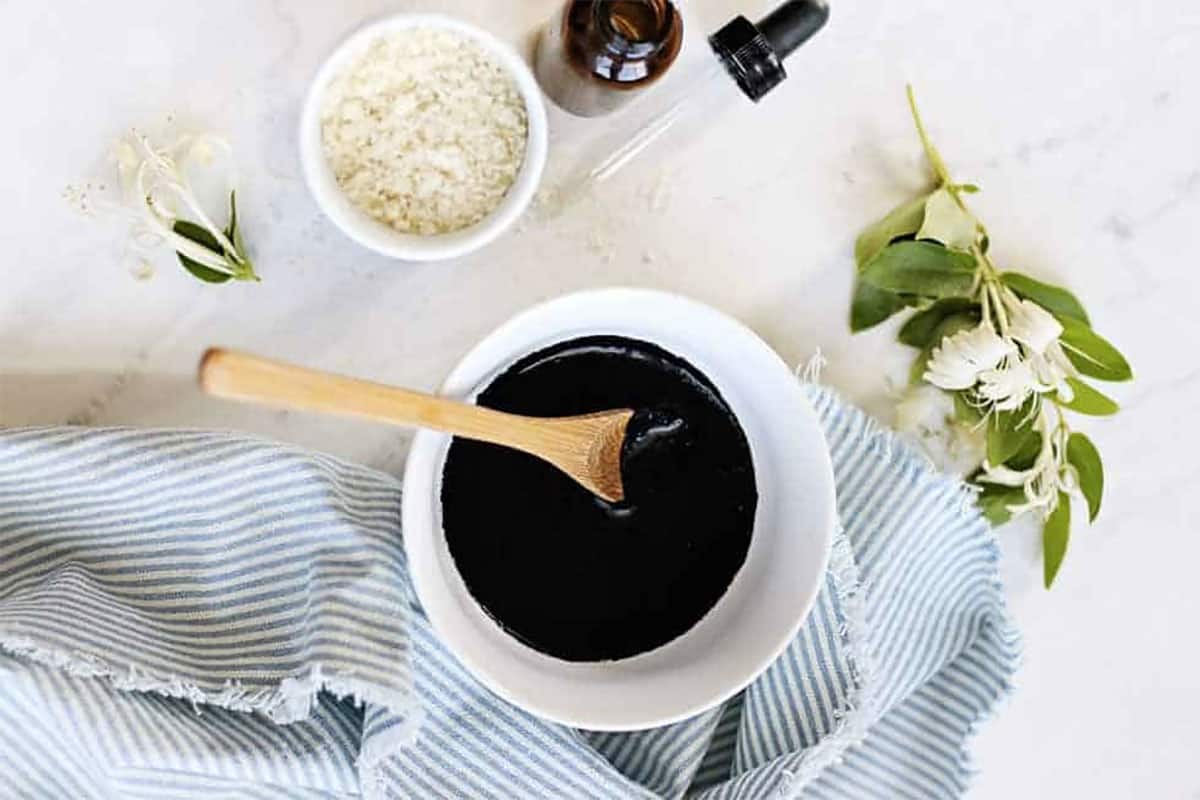
Because they draw impurities and bacteria to the surface of the skin, activated charcoal scrubs are perfect for binding to the oily residue and debris that are responsible for blocked pores (e.g., blackheads).
This mask doubles as a face cleanser that you can use 2–3 times a week. If you want to apply it as a face mask after using a different cleanser, you can leave out the castile soap.
—2 tablespoon unscented liquid castile soap
—1 tbsp almond, jojoba, apricot kernel, or vitamin E oil
—2 tablespoon finely ground brown or white rice flour
—1 tablespoon baking soda
—2 teaspoon activated charcoal
In a small bowl, stir together the castile soap and oil. Add the rice flour, baking soda, and activated charcoal. The mixture may bubble up a bit.
Keep stirring until smooth and creamy. Store in an airtight container in a cool, dry place.
To use, splash your face with a little water, so it is damp. Take 1–2 teaspoons of the scrub and gently apply to the face with fingertips in small, circular motions, being careful to avoid the area around the eyes.
To use as a mask, let the scrub sit on the face for 10 minutes to maximize its oil-absorbing benefits. Rinse with lukewarm water and pat face dry.
4. Moisturizing Charcoal + Honey Face Mask
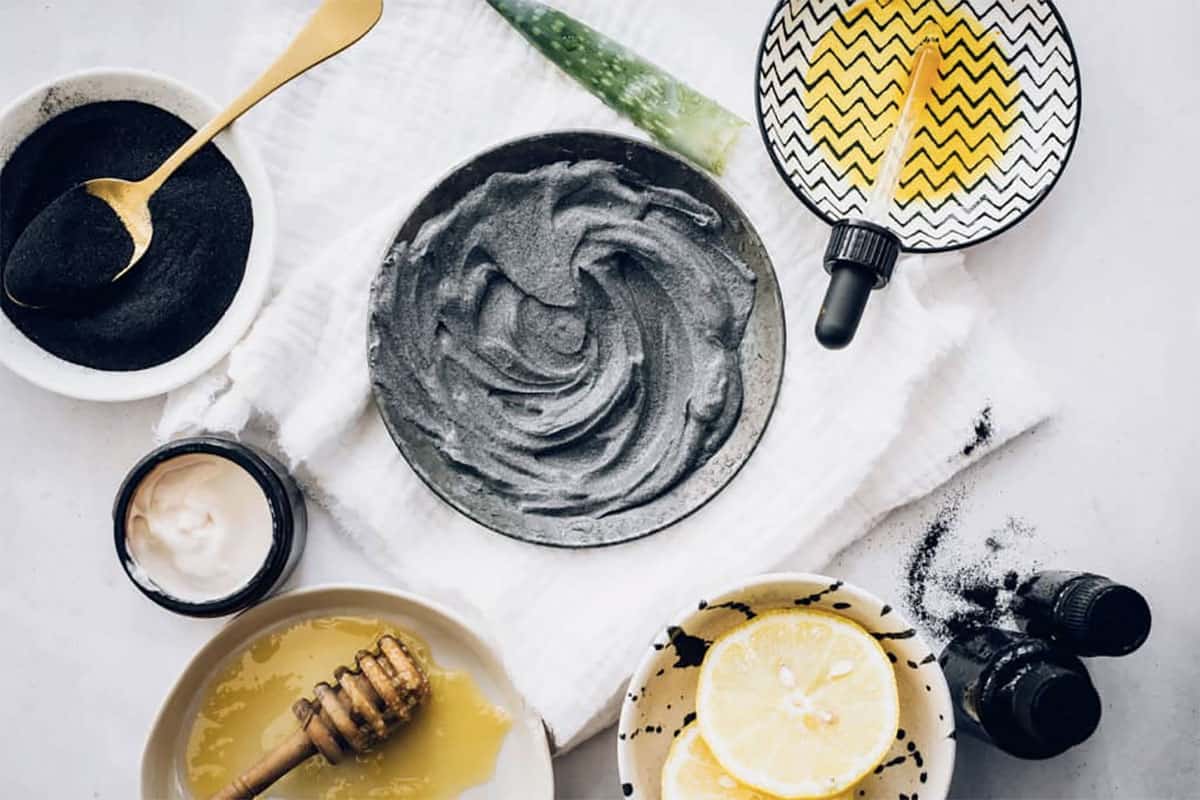
This soothing honey mask with matcha relieves redness and inflammation, while charcoal helps to draw out the source of the skin irritation.
Honey has been used for decades in the treatment of wounds, skin rashes, and as a moisturizer and hydrating cream [source]. Matcha has been increasingly popular in the anti-aging skincare industry because of its antioxidant properties [source].
—1–2 tablespoon raw honey
—1 teaspoon matcha powder
—1–2 activated charcoal capsules
Add the honey to a small bowl, and stir in the matcha and charcoal powders. With clean fingers, spread over the face and let sit for 15 minutes. Rinse with cool water and apply moisturizer.
5. Acne-Fighting Charcoal + Aloe Face Mask
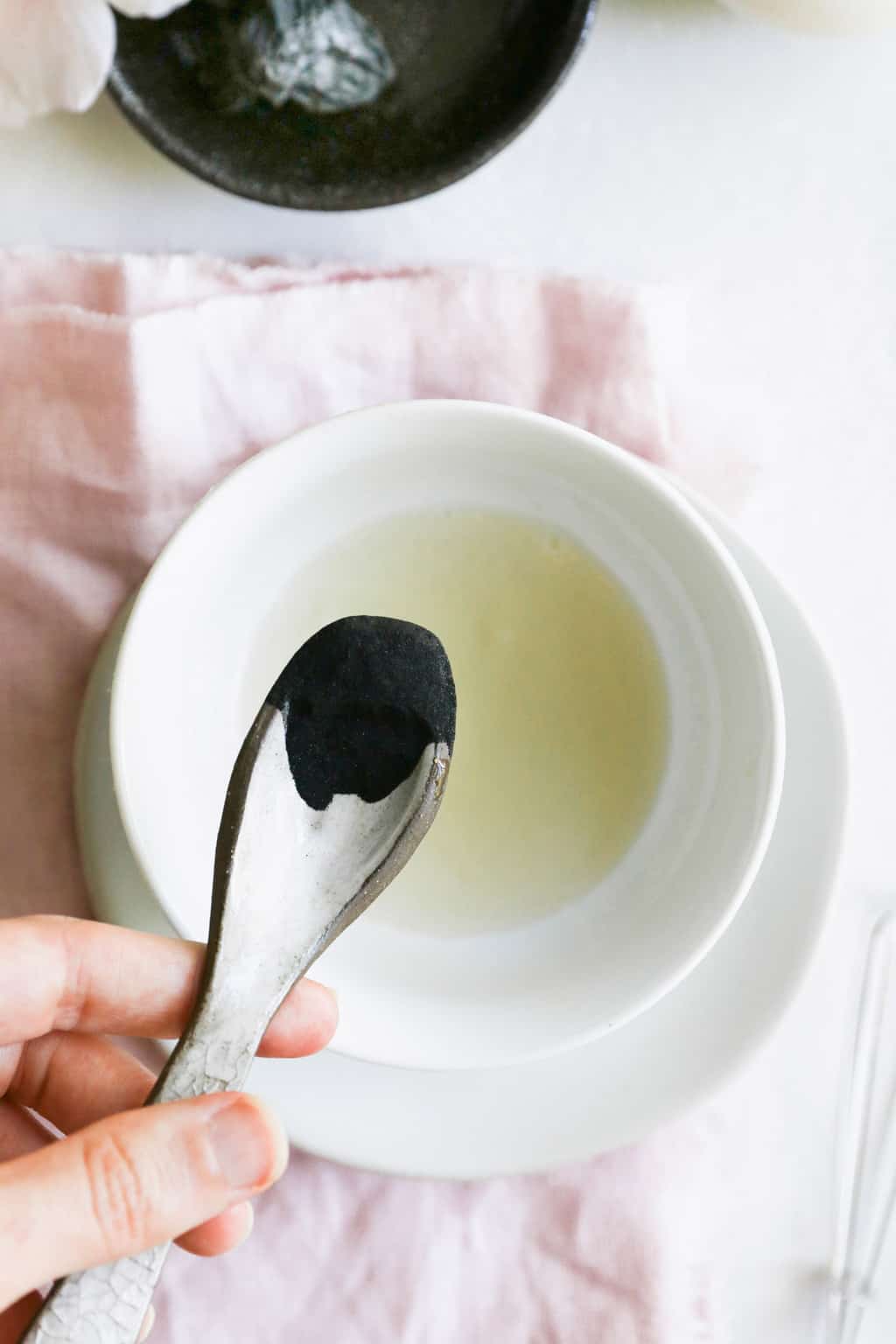
Combine charcoal with an aloe mask for a moisturizing treatment that won't clog pores or send oily skin into overdrive. Aloe skin benefits also include faster healing and reduced inflammation [source], so you can also use this mask to soothe itchy, irritated, or dry skin as well.
—Activated charcoal
—Aloe vera gel
—1 drop of tea tree oil
Mix ingredients in a small bowl, and use your finger to mix them before applying to the skin. In circular motions, work the charcoal mixture around your face for 1 minute.
Let the mask sit for 10–15 minutes. Rinse thoroughly with warm water.
6. Charcoal Detox Cleansing Grains + Mask
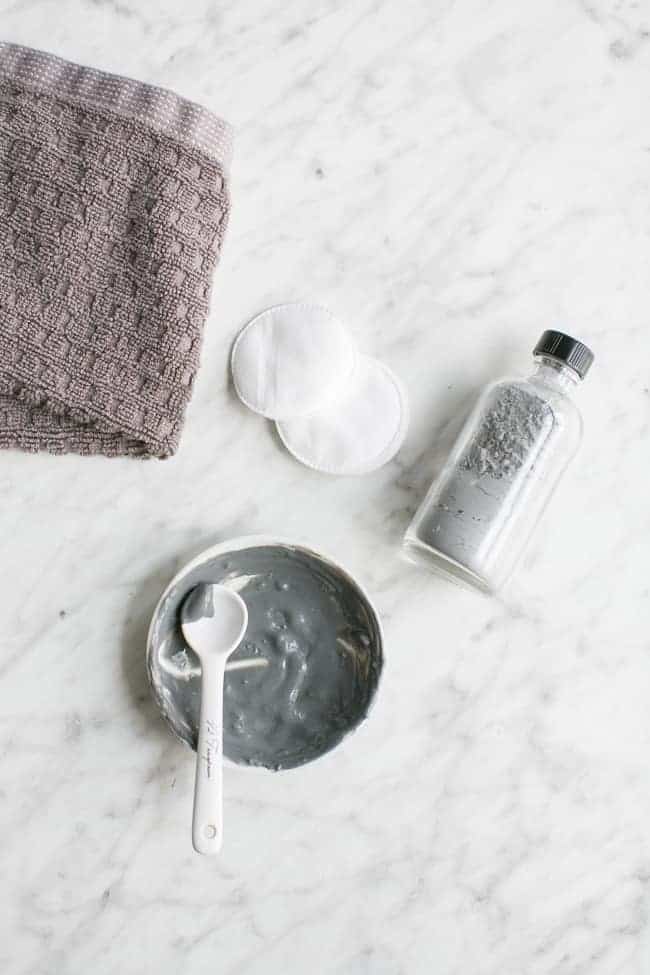
Tired of mixing up a new face mask all the time? You'll love these cleansing grains with gently exfoliating ingredients like clay and oats that can sit on the counter, ready for use anytime you need a deep cleanse and gentle exfoliation. For aging skin, you can also add finely ground almonds.
—¼ cup oats, ground
—¼ cup kaolin clay
—¼ cup bentonite clay
—10 activated charcoal capsules
—7 drops each lavender and tea tree essential oil
Combine powders, and stir in essential oils. Keep it in a closed container.
To use, dispense a small amount (about a teaspoon) of grains into the palm of your hand. Add a few drops of water or rose water to get a wet paste.
Gently massage into skin, making small circles with your fingers. Leave the grains on your face for 10–15 minutes for a deep cleansing face mask.
7. Gentle Exfoliation Charcoal + Yogurt Face Mask
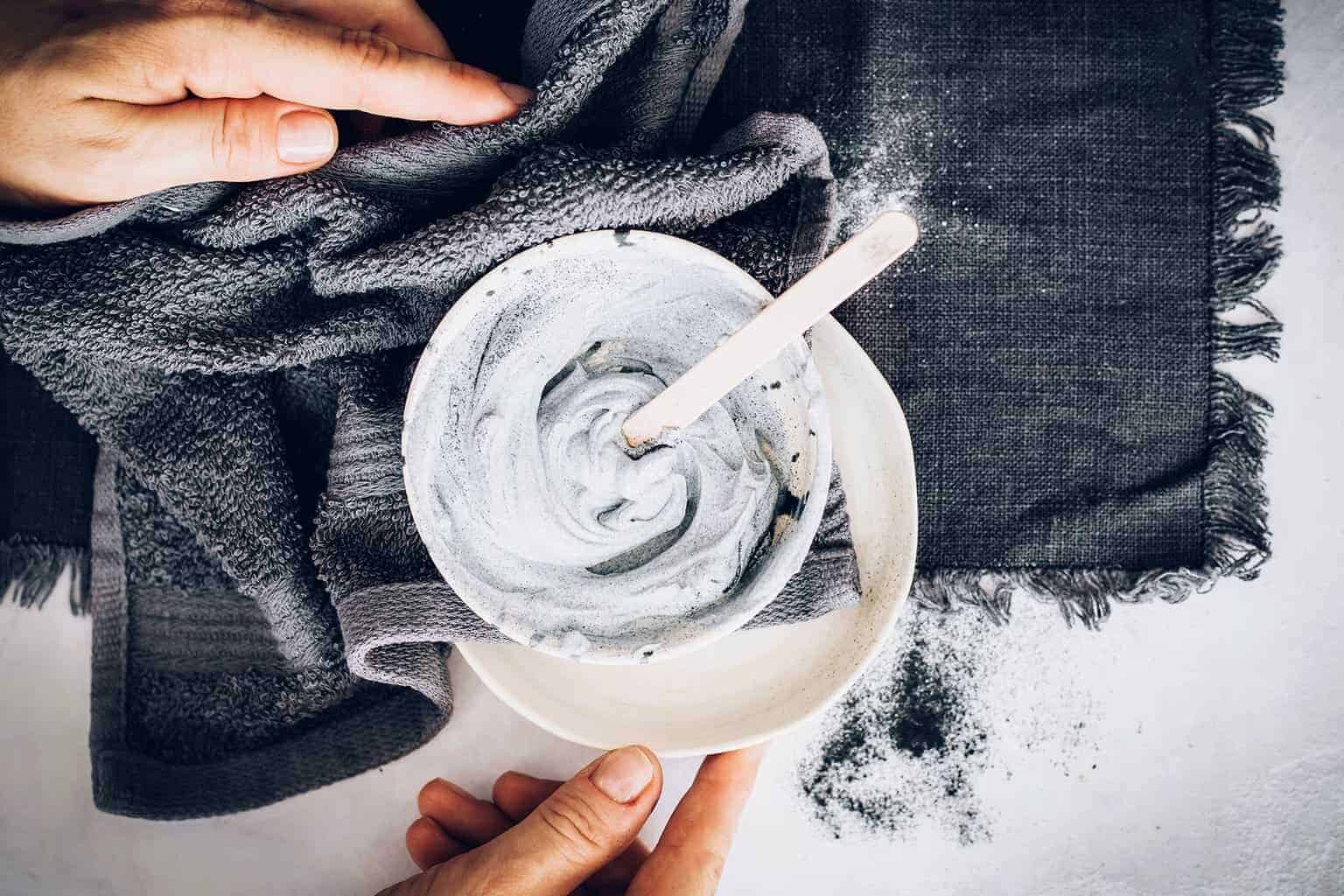
The lactic acid in yogurt masks gently dissolves the layers of dead skin cells on your face, which lets charcoal get to work, drawing out the oil and dirt clogging your pores.
—2 tablespoon of plain, unflavored Greek yogurt, preferably organic and full-fat
—1–2 activated charcoal capsules
—1–2 teaspoon raw honey (optional)
Blend yogurt, charcoal, and honey (if using) together until you get a creamy paste. Then apply liberally to your face and neck with a brush or your fingers.
Leave the mask on for 20 minutes, then wash off with warm water. Apply moisturizer and enjoy your bright, glowing skin.
8. Pore Cleansing Charcoal + Clay Mask
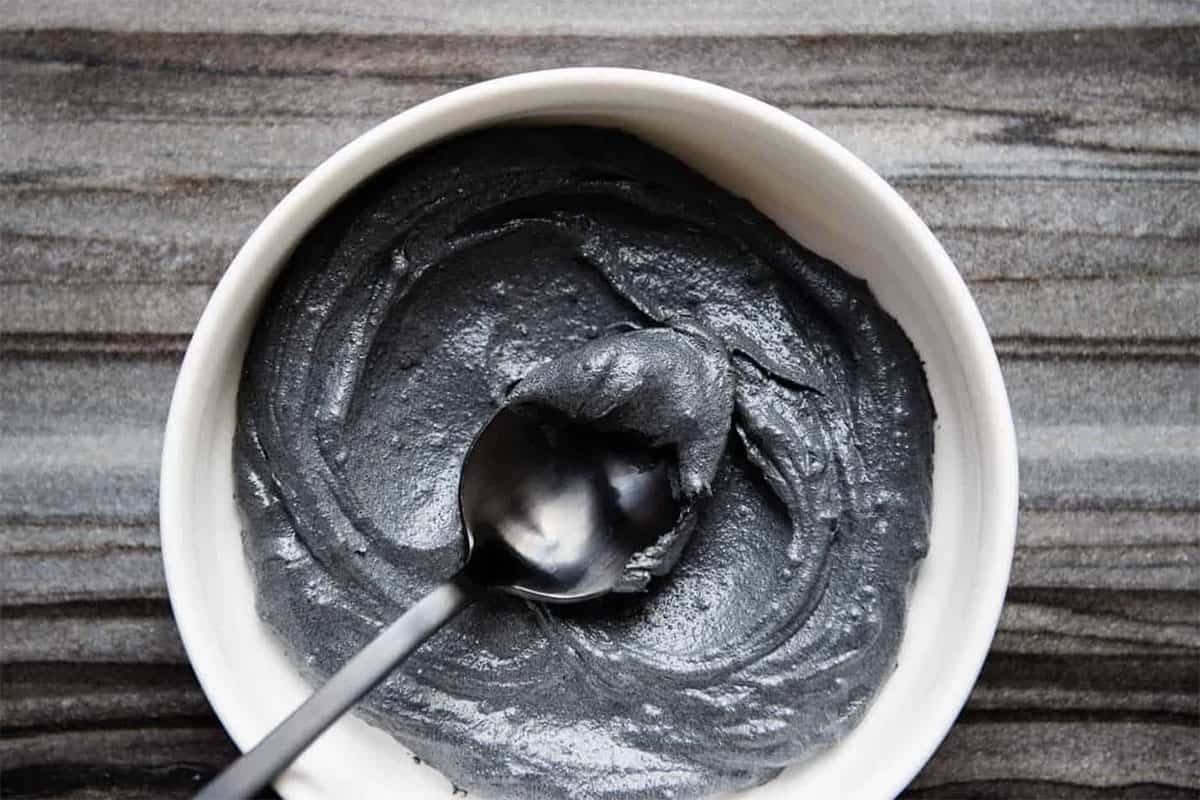
Think of clay and charcoal working together like a vacuum cleaner to clear out your pores. Adding a dash of cinnamon helps ward off acne-causing bacteria while stimulating blood flow to leave skin bright and glowing [source].
Patch test or leave out the cinnamon if your skin is sensitive or inflamed. Skip the water and add more oil if your skin is dry.
—1 teaspoon French green clay
—2 capsules activated charcoal
—¼ teaspoon organic cinnamon powder
—1 teaspoon water
—1 teaspoon almond oil
Combine ingredients and stir to make a paste. Use a brush or your fingers to apply a thick layer to the face, avoiding the eye area.
Let the mask dry for 10–15 minutes, then rinse with warm water. Follow with moisturizer.
9. Charcoal Peel Off Mask
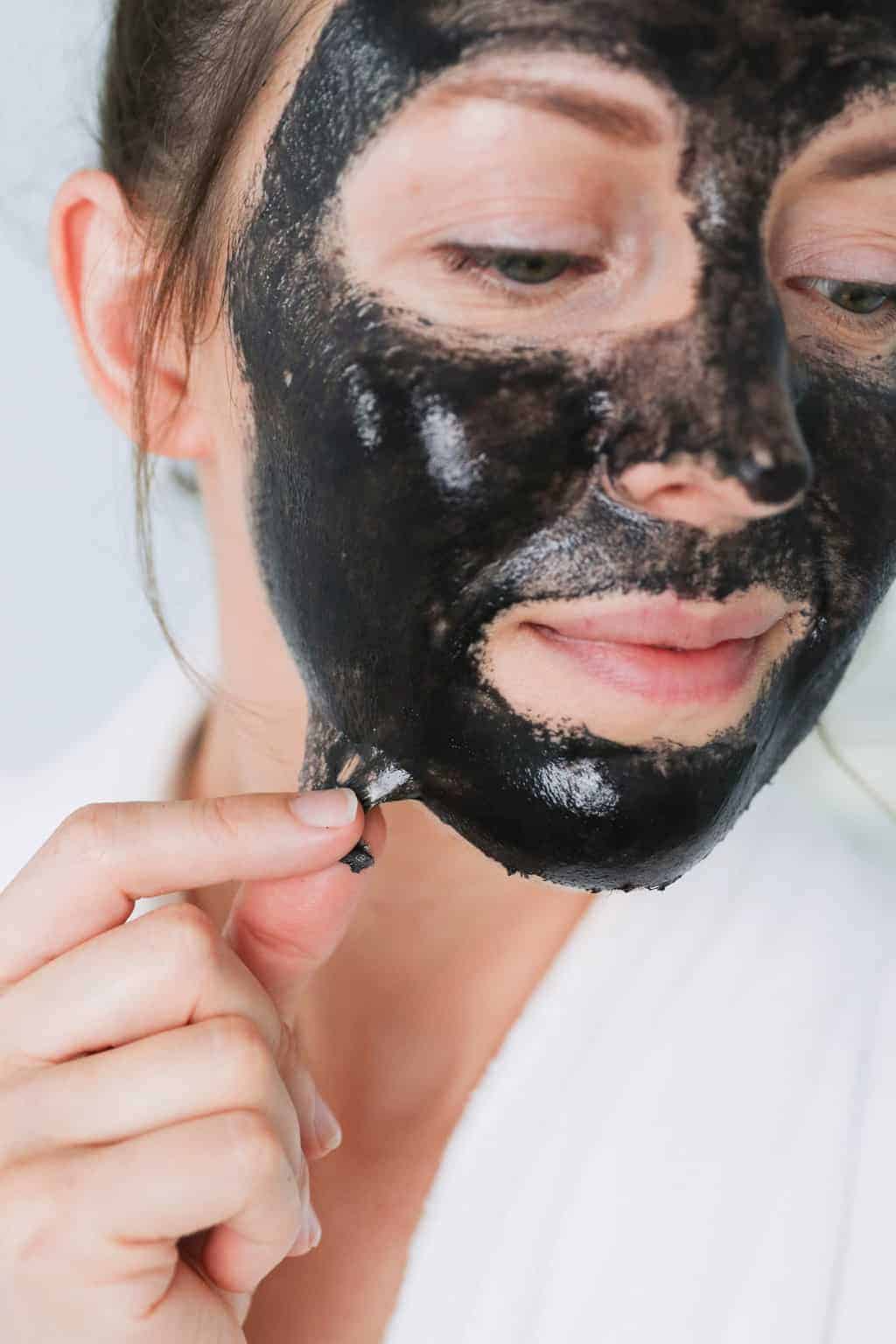
If you love a peel-off mask but not so much the ouch factor, this gentle activated charcoal peel-off mask is for you. While charcoal draws impurities, the other ingredients—such as witch hazel and coconut milk powder—help the skin feel clean and refreshed.
—1 tablespoon water
—1-½ teaspoon agar agar powder or 2 tbsp unflavored gelatin
—1 tbsp witch hazel
—1 tsp activated charcoal
—1 tsp kaolin clay
—½ tsp coconut milk powder
Combine water, witch hazel, and gelatin in a small, microwave-safe bowl. Stir well.
Microwave in 15-second intervals until the mixture is warm and the gelatin dissolves when stirred. Add kaolin clay, coconut milk powder, and activated charcoal. Stir well.
Let cool for a minute or two before applying the mask to your face. Leave on for 10-15 minutes then rinse with warm water.
Activated charcoal face masks can be customized based on different skin types and concerns. Here are some variations for various skin types:
10. Oats + Charcoal Face Mask For Dry or Sensitive Skin
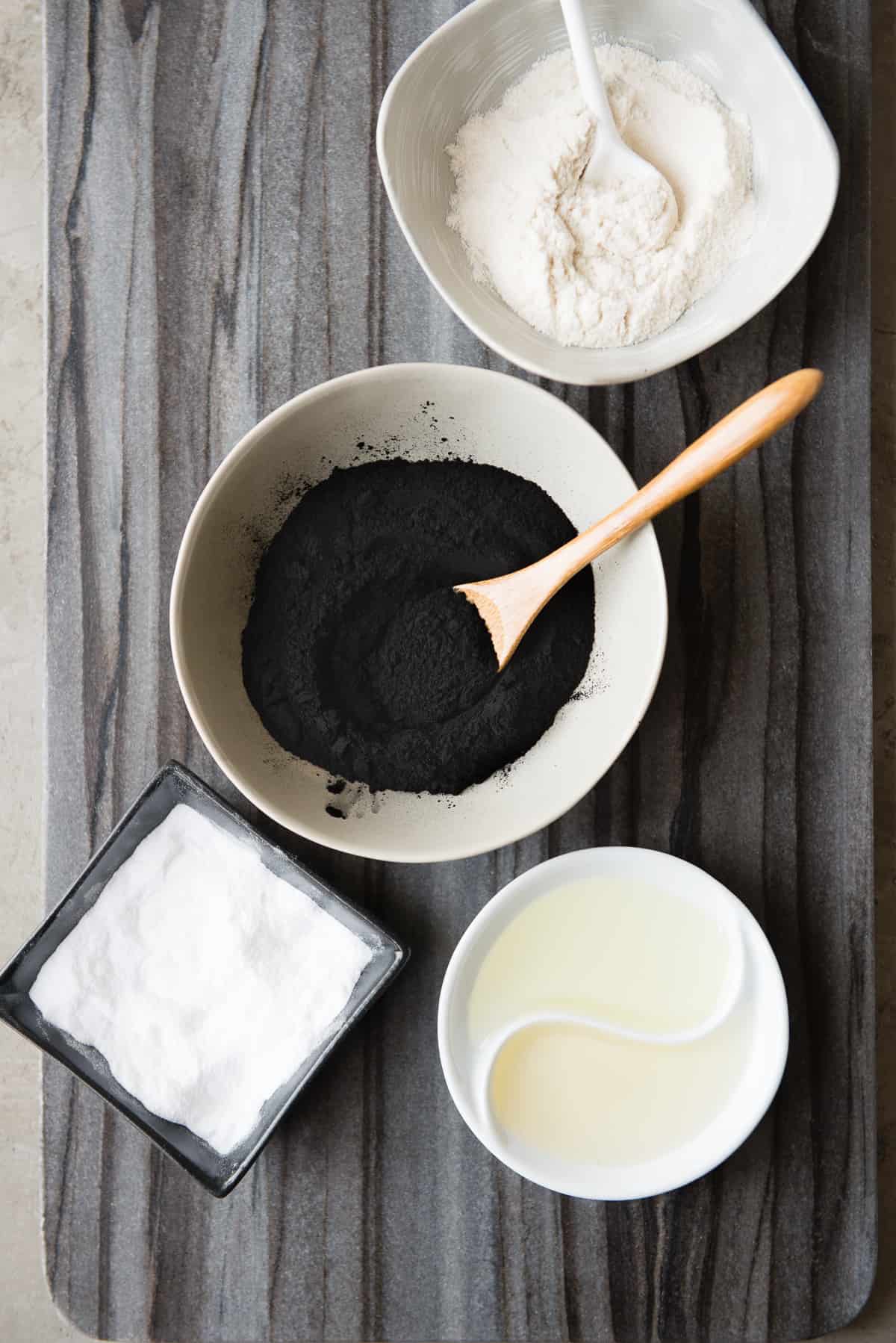
Tailored for dry or sensitive skin, this activated charcoal face mask combines the detoxifying power of activated charcoal with the calming effects of colloidal oatmeal. Honey, a natural humectant with antibacterial properties, provides moisture and aids in soothing sensitive skin.
The addition of yogurt offers a gentle exfoliation, leaving the skin feeling nourished and revitalized. This mask aims to detoxify without causing irritation, making it suitable for those with sensitive or dry skin.
- 1 tablespoon activated charcoal powder
- 1 tablespoon colloidal oatmeal
- 1 tablespoon honey
- 1-2 tablespoon plain yogurt
Combine ingredients in a small bowl and spread over clean skin. Leave on for 10-15 minutes then gently massage into the skin as you rinse with warm water.
11. Green Tea Charcoal Mask For Combination Skin
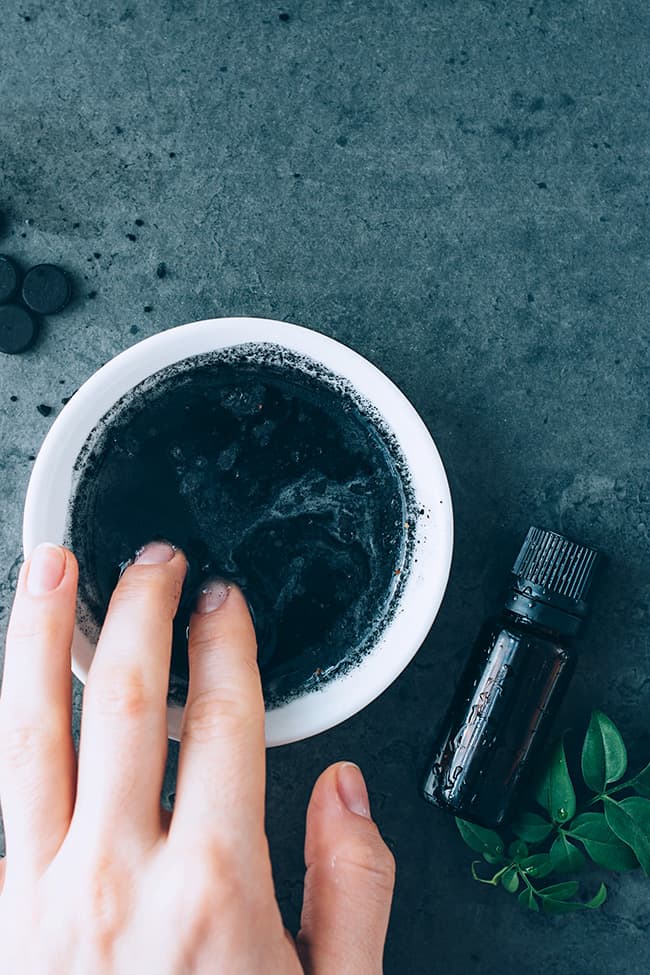
Perfectly balancing the needs of combination skin, this activated charcoal mask combines detoxifying properties with gentle care. Activated charcoal helps absorb excess oil, while green tea, rich in antioxidants, provides anti-inflammatory benefits.
Kaolin clay, chosen for its gentleness, caters to the different areas of combination skin without over-drying. Jojoba oil adds a touch of moisture, leaving the skin feeling refreshed and harmonized.
- 1 tablespoon activated charcoal powder
- 1 tablespoon green tea (cooled)
- 1 tablespoon kaolin clay
- 1 tablespoon jojoba oil
Brew a cup of green tea and let it cool. Combine all ingredients in a non-metal bowl and stir with a non-metal spoon. Add more clay or tea until you have a spreadable consistency.
Apply to your skin with a brush or clean fingers and let it sit for 10-15 minutes. Feel free to skip the oil and add extra green tea if your skin is oily.
12. Rose Charcoal Mask For Aging Skin
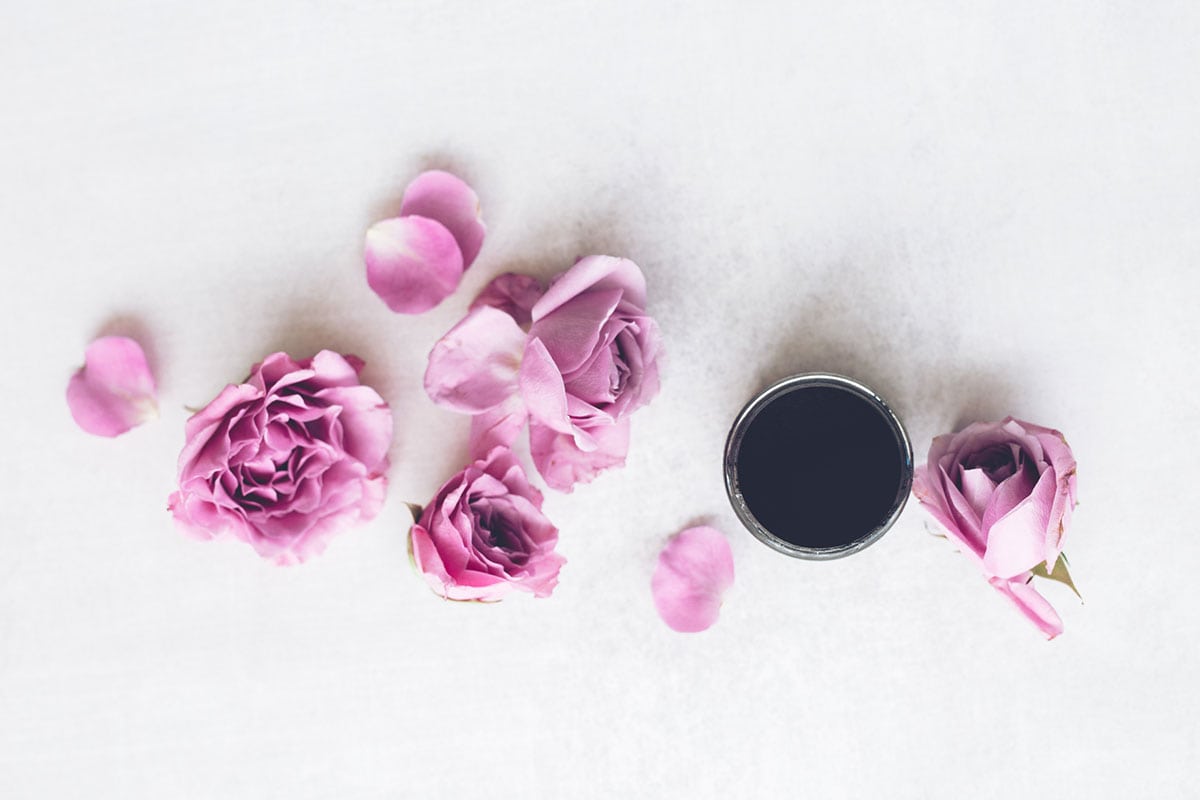
Designed to address the concerns of aging skin, this activated charcoal face mask incorporates powerful ingredients to promote a youthful complexion. Activated charcoal and bentonite clay work to cleanse and tighten the skin, reducing the appearance of pores.
Rosewater soothes skin while vitamin E oil provides anti-aging benefits, offering moisture and protection against environmental stressors.
- 1 tablespoon activated charcoal powder
- 1 tablespoon bentonite clay
- 1 tablespoon rosewater
- 1 teaspoon vitamin E oil
Combine all ingredients in a non-metal bowl and stir with a non-metal spoon. Add more water or clay to reach a spreadable consistency.
Apply to your face, avoiding the eye area, and let sit for 15 minutes then rinse.
13. Papaya Charcoal Mask For Dull or Uneven Skin Tone
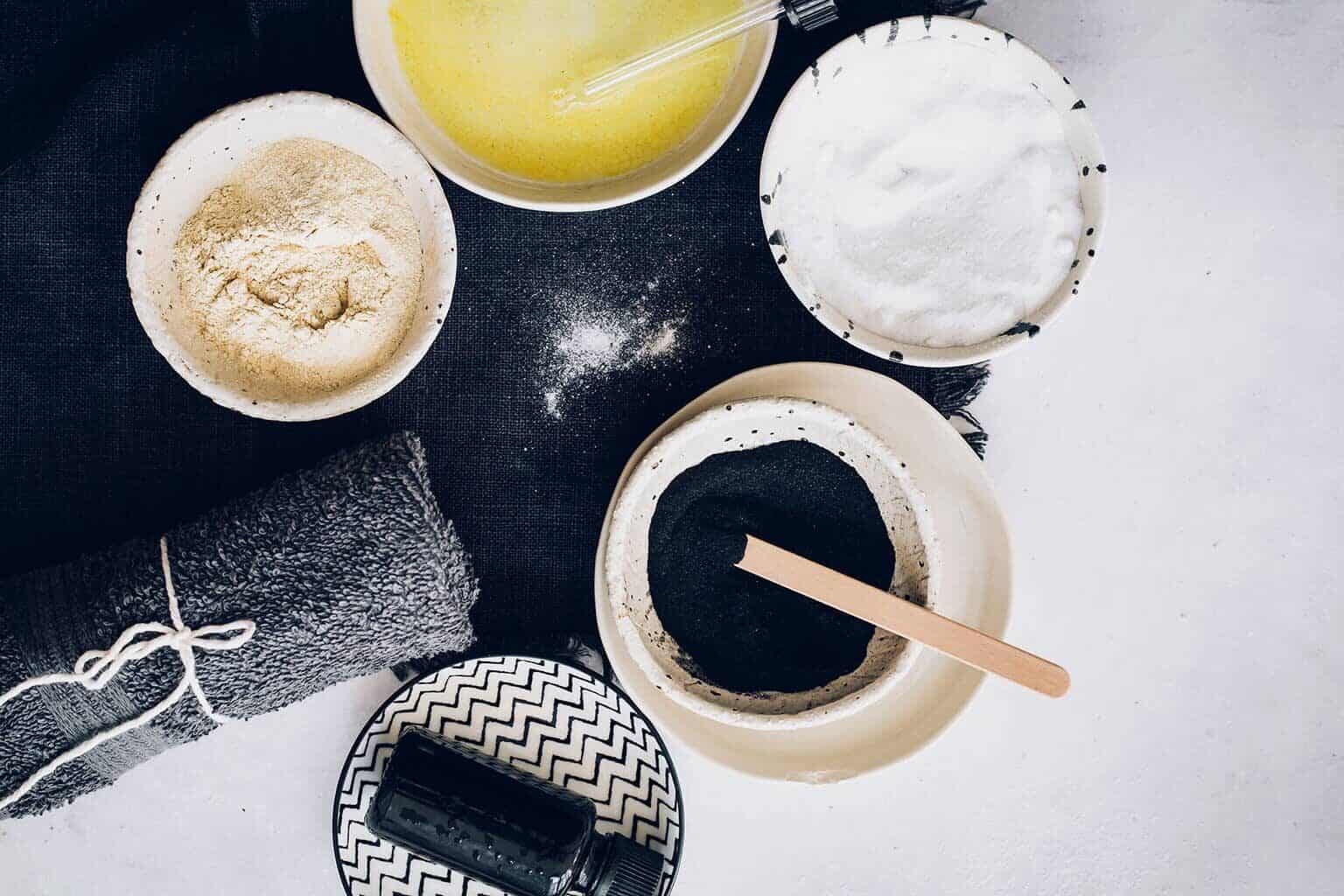
This activated charcoal mask is formulated to combat dullness and uneven skin tone. Activated charcoal detoxifies the skin, while papaya puree, abundant in enzymes, works to brighten the complexion.
Yogurt provides a gentle exfoliation for smoother skin, and the addition of lemon juice helps even out skin tone, resulting in a refreshed and rejuvenated appearance.
- 1 tablespoon activated charcoal powder
- 1 tablespoon papaya puree (ripe)
- 1 tablespoon yogurt
- 1 teaspoon lemon juice
Remember to patch test any new ingredients on a small area of your skin to ensure there are no adverse reactions. Additionally, consult with a dermatologist if you have specific skin concerns or conditions.
More Ways To Use Charcoal
If you're new to activated charcoal, there are so many home and beauty uses for it! Yes, it can get a little messy, but don't be intimidated. After you whip up a face mask, try this charcoal face wash recipe or make these gut-healing gummies.
FAQ
It's generally recommended to use a charcoal face mask once or twice a week. Using it too frequently may lead to skin dryness. Pay attention to how your skin responds and adjust the frequency accordingly.
Yes, you can add essential oils for added benefits and fragrance. However, be cautious with the amount, as essential oils can be potent. Conduct a patch test to ensure you don't have any allergic reactions.
The recommended time for leaving a charcoal face mask on is typically 10-15 minutes. However, always follow the specific instructions provided with your chosen recipe, as leaving it on for too long may lead to dryness or irritation.
Yes, you can use activated charcoal capsules by breaking them open and using the powder inside. However, ensure that the capsules don't contain additional ingredients that could be harmful to the skin.
References
1. Zellner T, et al. The use of activated charcoal to treat intoxications. Dtsch Arztebl Int. 2019.
2. Lee YB, et al. Potential role of the microbiome in acne: a comprehensive review. J Clin Med. 2019.
3. Mandal MD, et al. Honey: its medicinal property and antibacterial activity. Asian Pac J Trop Biomed. 2011.
4. Prasanth MI, et al. A review of the role of green tea (Camellia sinensis) in antiphotoaging, stress resistance, neuroprotection, and autophagy. Nutrients. 2019.
5. Sánchez M, et al. Pharmacological update properties of Aloe vera and its major active constituents. Molecules. 2020.
6. Ranasinghe P, et al. Medicinal properties of “true” cinnamon (Cinnamomum zeylanicum): a systematic review. BMC Complement Altern Med. 2013.
This post was medically reviewed by Dr. Rina Mary Allawh, M.D., a dermatologist who practices adult and pediatric medical dermatology, skin cancer treatment, and cosmetic dermatology. Learn more about Hello Glow's medical reviewers here. As always, this is not personal medical advice, and we recommend that you talk with your doctor.
361

